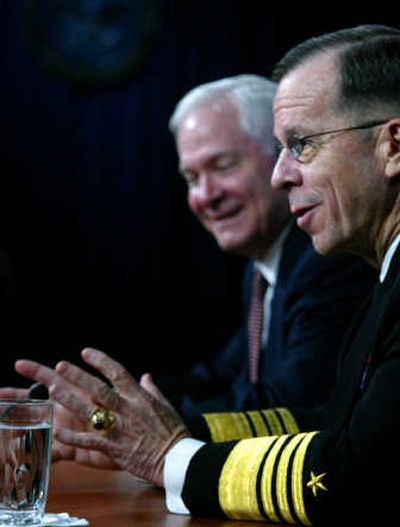U.S. focuses on Iran as key threat in Iraq

WASHINGTON – Last week’s violence in Basra and Baghdad has convinced the Bush administration that actions by Iran, and not al-Qaida, are the primary threat inside Iraq, and has sparked a broad reassessment of policy in the region, according to senior U.S. officials.
Evidence of an increase in Iranian weapons, training and direction for the Shiite militias that battled U.S. and Iraqi security forces in those two cities has fixed new U.S. attention on what Defense Secretary Robert Gates on Friday called Tehran’s “malign” influence, the officials said.
The intensified focus on Iran coincides with diminished emphasis on al-Qaida in Iraq as the leading justification for an ongoing U.S. military presence in Iraq.
In congressional hearings this week, Army Gen. David Petraeus said the U.S. military has driven al-Qaida from Baghdad, Anbar province and central Iraq, and he depicted the group as now largely concentrated in a sharply reduced territory around the northern city of Mosul.
During their Washington visit, Petraeus, the top U.S. military commander in Iraq, and Ambassador Ryan Crocker barely mentioned al-Qaida, but they spoke extensively of Iran.
With “al-Qaida in retreat and disarray” in Iraq, said one official who spoke on the condition of anonymity, “we see other obstacles that were under the waterline more clearly. … The Iranian-armed militias are now the biggest threat to internal order.”
Partly in response to advice from Petraeus and Crocker, the administration has initiated an interagency assessment of what is known about Iranian activities and intentions, how to combat them and how to capitalize on them. The review stems from an internal conclusion, following last week’s fighting, that the administration lacked a comprehensive understanding and a sophisticated approach.
President Bush reiterated Friday that if Iran continues to help militias in Iraq, “then we’ll deal with them,” saying in an interview with ABC News that “we’re learning more about their habits and learning more about their routes” for infiltrating or sending equipment.
But he also reaffirmed that he has no desire to go to war with Tehran. Saying that his job is to “solve these issues diplomatically,” Bush suggested heightened interest in reaching a solution with other countries. “You can’t solve these problems unilaterally. You’re going to need a multilateral forum.”
Iran has long been seen as a spoiler in Iraq, with such strong ties to all of the major Shiite political and militia groups, including that of Prime Minister Nouri al-Maliki, that other Arab countries have begun to regard Iraq as almost a client state of Iran.
The recent fighting in Basra – which began when Maliki launched a military offensive against the Mahdi Army militia of Shiite cleric Muqtada al-Sadr, revealed a threat and an opportunity, officials said.
U.S. military officials said that much of the plentiful, high-quality weaponry the militia used in Basra and in rocket attacks against the Green Zone in Baghdad, where the U.S. Embassy and much of the Iraqi government are located, was recently manufactured in Iran. At the same time, the militia’s improved targeting and tactics indicated stepped-up Iranian training.
Interrogations of four leaders of Iran’s Revolutionary Guard Corps Quds Force captured in Iraq in December 2006 and January 2007 have also bolstered U.S. conclusions that portions of Sadr’s militia are directed from Tehran.
Despite earlier indications that Iranian backing for Iraqi armed groups and the flow of Iranian arms have waned, Adm. Michael Mullen, chairman of the Joint Chiefs of Staff, said Friday that “this action in Basra was very convincing that indeed they haven’t.” Basra “gave us much more insight into their involvement in many activities,” he said.
Gates, who appeared with Mullen at a Pentagon news conference, said of Iran: “We are going to be as aggressive as we possibly can be inside Iraq in trying to counter their efforts.” Iraqi security operations in Basra, he said, have been “a real eye-opener” for Maliki’s government.
Petraeus told Congress that Maliki had launched the offensive hastily and with inadequate preparation, leading to a standoff and the need to call in U.S. air support.
Iran’s brokering of a tentative cease-fire among Shiite political groups and the militia in Tehran added to U.S. consternation.
Administration officials worried that Iran appeared in control of events in Iraq, while the United States seemed weak and uninformed.